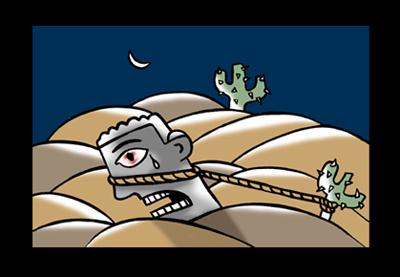 | « Back to article | Print this article |
 'We have,' says Anvar Alikhan, 'proved right Winston Churchill, when he warned in 1947 that 'Power will go to rascals, rogues, freebooters...'
'We have,' says Anvar Alikhan, 'proved right Winston Churchill, when he warned in 1947 that 'Power will go to rascals, rogues, freebooters...'
Illustration: Uttam Ghosh
The best of times, the worst of times: my generation, born in the 1950s, has seen it all.
We saw the Nehruvian era, filled with pride and hope, with its Bhakra dams and its grand Five Year Plans.
We saw the swift, humiliating descent into beggary in the 1960s, holding out our bowl for American PL-480 wheat and other international handouts.
We saw the bizarre Indira Gandhian 1970s, with its prickly nationalistic arrogance, while our economic system was being silently gutted from within, wiping out the best years of our generation's working lives, and sending our brightest minds fleeing the country as economic refugees.
We saw the thrilling new dawn of the early Rajiv Gandhian years -- false, as it turned out, and giving way, quickly, to the hard cynicism of the late 1980s.
We saw our country teeter on the abyss of default in the early 1990s, and Manmohan Singh's bewildering reforms, which pundits predicted would bring nothing but foreign economic enslavement.
We then watched, disbelieving, as India suddenly to morphed into an 'economic super-power,' hyphenated with China for global economic standing.
Could this be the same economic basket case we remembered from our teenage years? What made this transformation even more perplexing for us, was the fact that it seemed to have happened largely on the back of two factors that were such a cause of worry to us, back in the '70s: Our legions of unemployed engineers, and our Malthusian population growth (now suddenly redefined as our 'demographic dividend').
Most significantly, through all of this, we saw a slow, sickening degeneration in the calibre of our politicians, professional as well as personal. A biting cartoon, back in the 1980s, seemed to say it all: In a parody of the classic illustration of the Evolution of Man, it depicted the decline of the Indian politician, from the proud, striding, Gandhitopi'd superhero of 1947 to the hairy, grunting, Neanderthal politician of the current day, his knuckles brushing the ground.
Since then, that decline has only continued. We have proved right Winston Churchill, when he warned in 1947 that 'Power will go to rascals, rogues, freebooters... leaders will be of low calibre and men of straw... They will fight amongst themselves for power and will be lost in political squabbles.'
As I watch the goings on in Parliament in the closing days of 2011, over the Lokpal Bill and the FDI issue, my heart sinks. Is this what my country has come to?
Shashi Tharoor recently made a powerful case, in his much talked-about essay, 'Shall we call the President?,' published in Tehelka, for moving from our current Westminster-style parliamentary system to an American-style presidential system.
The parliamentary system, he argues, was, from the start unsuited to Indian conditions. And now, given the scum-like level to which today's elected representatives have descended, it has outlived any utility it may have ever had.
What India needs to do, therefore, he argues, is to move to a US-style presidential system, which would emphasise governance, rather than mere political manoeuvring to survive in power.
There is much merit in Tharoor's thesis. But a key issue that he seems to have overlooked is that the best government is the one you can get rid of most easily. You can do that under the parliamentary system; it is much more difficult in a presidential system.
Imagine a situation, where, let us say -- just for example a Mayawati gets elected President by the sheer weight of her UP vote-base, and, no matter what she does in power during her five-year tenure (short of a downright impeachable offence) you cannot get rid of her. What then?
No, Tharoor's proposal is not, on closer scrutiny, the solution.
So what is the solution?
Cynical as I may sound, all I have to offer under the circumstances, is the prescription of Maharishi Mahesh Yogi, who, in the 1980s, had placed ads in the international media, offering world governments his 'scientifically proven Unified Field technology; to solve their political, social and economic problems.
What you need to do, according to the good Maharishi, is to get the square root of one percent of your population to do transcendental meditation in synchrony, twice a day. This will, apparently, through the 'Extended Maharishi Effect,' create wide-ranging positive benefits in society -- from the lowering of crime and inflation rates to a reduction in terrorism.
Presumably, it will also bring about the much-needed positive changes in our political system (Ask the Mozambiquan government: It was one government that apparently implemented the Maharishi's technology).
And, if all else fails, here's a prayer from Rabindranath Tagore, suitably twisted to our times:
Where the mind is fearful;
And the head is bowed low;
Where ignorance runs free;
Where the world has been broken up into fragments
by narrow domestic walls;
Where words come out from the depth of falsehood;
Where tireless striving stretches its arms towards corruption;
Where the clear stream of reason has lost its way
into the dreary desert sand of dead habit;
Where the mind is led backward from thee into ever-narrowing thought and action;
From that heaven of bondage, my Father, let my country awake.
Have a Happy 2012!